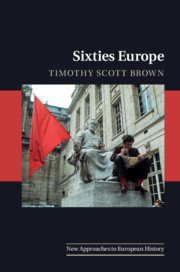Afterword
Published online by Cambridge University Press: 16 July 2020
Summary
To think about sixties Europe is to do more than consider Europe as a geographic space and the 1960s as a time period. It is to reflect on fundamental unresolved problems of modernity. In a moment when the processes of cultural and economic globalization are more advanced than at any time in human history, a particular vision of free market capitalism appearing under the sign of “neoliberalism” seems so solid as to represent a form of common sense. “Yet, since the financial collapse of 2008, and especially with the economic disruption caused by the global pandemic of 2020, the capitalist order looks a lot less certain than it used to. The political consequences of that uncertainty have thrown politics open in a way they have not been for decades.”
A particularly disquieting feature of the present moment is the way in which radical right-wing movements in Europe and America have made themselves beneficiaries of the widespread anger about neoliberal globalization. The liberal establishment, in both in Europe and America, has been shocked by widespread resistance to the political-economic consensus it has done so much to put in place. On the right, paradoxically, the reaction to the crisis of capitalism focuses its anger on various perceived challenges to white identity (e.g. immigration), positioning itself as a defensive bulwark against a radical left whose threat is more symbolic than real.
- Type
- Chapter
- Information
- Sixties Europe , pp. 222 - 224Publisher: Cambridge University PressPrint publication year: 2020

